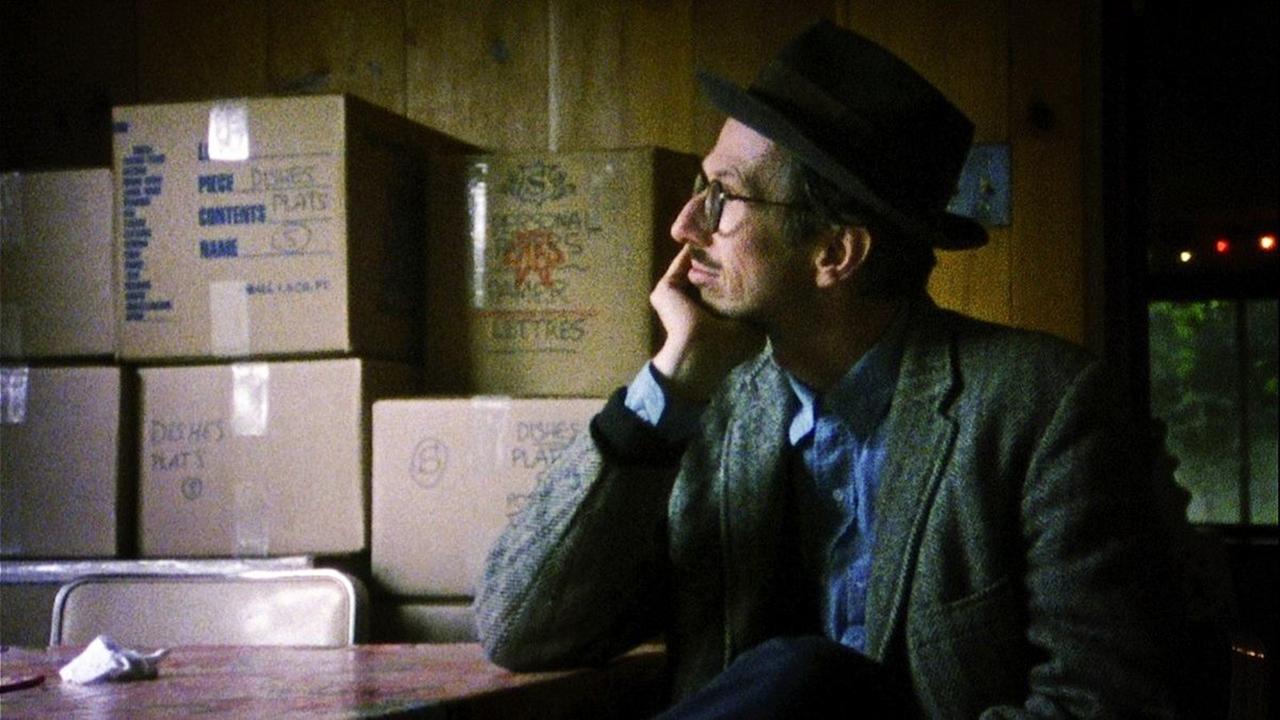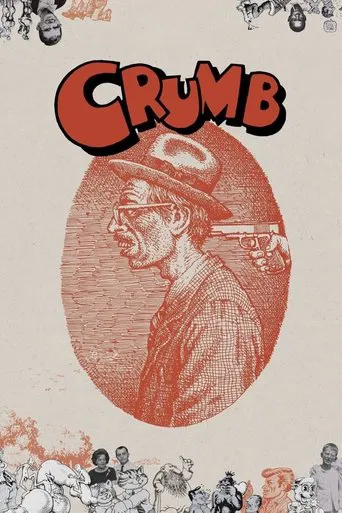

I did not know for some time what this film listed in the book 1001 Movies You Must See Before You Die was about, so I was very interested when I found out it was a documentary about a famous comic book cartoonist who I had heard about. Robert Crumb is the cartoonist and artist who drew and created popular comics and images such as Fritz the Cat, Mr. Natural and Keep on Truckin', he was the major pioneer for the genesis and popularisation of underground comics. This documentary details his life from developing his talent for drawing and making his own comic books with his two brothers, and of course becoming famous, but we also get an insight into the darker and strange regions of his subconscious mind. Interviews come from Crumb himself, his mother, his two brothers Charles and Maxon who are perhaps more strange than Robert, his then wife Aline Kominsky who knows her husband is unusual and his ex- girlfriends, as well as other artists, art critics and historians, and some admirers. The work of Crumb started from childhood with his love for Disney and various cartoon characters, where he and his brothers would create their own adventure comic books, and growing up he developed his bizarre style which included satire and sexual and perverted imagery. It is interesting to hear his various stories about his creations, his relationships with his brothers, his parents and the women he was with, it is interesting to see how disturbed his brothers are (one committed suicide after the film), and it is interesting to see his works discussed, including the mentioning of killing off Fritz the Cat following the cartoon film which he did not approve. This has many elements to it, it is fascinating, it is artistic, it is strange and it is disturbing, Crumb is obviously a genius with his cartoon style and imagination, but his eccentric personality and family background is the most interesting thing to watch this for, a most worthwhile documentary film. Very good!
... View MoreRobert Crumb has become an icon in the world of underground comic artists, and this documentary takes a close look at his work and the often unhappy life that informed it with an intimacy that is both gratifying and disturbing. Crumb's art and career are celebrated here on film even while his dysfunctional adolescence, his personal insecurities and his sexual obsessions are dissected by family, friends, pop psychologists and other invited crackpots. We see how, by his own understanding, that young Robert Crumb developed his talent as a vehicle to reach out and connect with other people, especially girls, and then had to deal with the frustrations resulting from his failure to achieve success with this. We see how his cartooning style evolved, how certain repeated subjects and motifs found their way into his work.We get a close up view of Robert Crumb that is almost too close up. The film's intimacy with its subject creates an almost claustrophobic feel, especially since Crumb himself is almost painfully awkward and lacking in personal charm, his mother is an ogress, his wife and daughter seem wary and stiff on camera, and his older brother is borderline crazy.Especially interesting is Robert Crumb's brother Charles, who is also a cartoonist and quite talented but clearly mentally unbalanced. His work shows genuine technical polish and is extremely evocative. It is also morbid and obsessive to the point of wallowing in darkness and despair, since its creator is an over-40, out of work dingbat who lives and works in the attic of the Crumb family home. Charles was a key inspiration to the young Robert Crumb, yet he is also an object lesson. With a little less professional drive and career focus, Robert could easily have followed his brother's path in life and art.
... View MoreWarning! Spoilers ahead! This movie succeeds largely because the documentarian does not inject his bias into the story, nor does he push any sort of agenda. He lets his subjects give their side of the story. He listens to both sides of the argument, whether they approve of what Robert Crumb has done as an artist, or whether he is nothing more than a bizarre pornographer. In all, the neutrality of the movie-maker is this film's best selling point, and I highly recommend this film as one that doesn't beat you over the head with its opinion or message; it lets the subjects do the talking.On the topic of semi-famous underground cartoonist Robert Crumb and his family, the film leaves one with an uneasy feeling at best. Charles, Robert's brother, and his mother reminded me of the recent HBO "Grey Gardens" movie, which itself was based on a documentary. If Robert Crumb can be perceived by some as a stark eccentric who cannot fit in to modern society, at least he has been able to create a stable home life with a loving family of his own. This movie is utterly tragic in its portrayal of Crumb's brothers, Charles and Maxon, especially so since Charles is gifted with exceptional cartooning skills (his artwork looked superior to Robert's best efforts), yet was cursed with severe psychiatric problems which prevented him from entering society as a functional individual. While Robert is a functional member of society, the overall impression the movie gave was that he was somewhat distant from other people, including his kin, and could not pick up easily on the feelings of others. The most poignant example of this was a brief (maybe one minute?) description of his father by Crumb's son from his first wife. Still, it was delightful to see Crumb nurture his children by helping them do artwork of their own.On the surface, Crumb may seem like a unique if peculiar individual: snobbish, detached from the outside world, relishing in dressing in anachronistic clothing and listening to old jazz records. Still, the impression was of a kind-hearted individual who found release through art. I did enjoy the movie's inclusion of those who objected to Crumb's art as blatantly pornographic, though my sense is that Crumb's work does not have the mainstream popularity which would make it troubling to society at large, nor the messages in his illustrations singularly sexual, to classify it as straightforwardly pornographic.A solid effort. I highly recommend this film to those who love documentaries.
... View MoreUpon rewatching the film, the first thing that stands out about it is how poorly it has held up as a filmic 'portrait of an artist'. In the intervening years, documentaries such as The Kid Stays In The Picture, American Splendor, and Mayor Of The Sunset Strip have used narrative and filmic techniques that make Crumb seem downright quaint and formulaic, by comparison. From the technique of highlighting the bizarre and uninteresting people that inhabit mumbling cartoonist Robert Crumb's life, to having statically placed talking head experts- such as Femininazi journalist Peggy Orenstein and Deirdre English, a former editor of Mother Jones magazine, who decry Crumb's alleged misogyny and racism, to egghead elitists like Time magazine art critic Robert Hughes who ridiculously masturbate over the most inane and puerile of Crumb's work, to ending the film with a text-laden write-up of what happened after the cameras stopped rolling, Crumb seems to be a relic from another age; which is ironic since many in the film seem to already- by then, associate him with the bygone psychedelia of the 1960s. But that's what it is- a pre-Internet ideal of the classic Junior High School approach to its subject matter. Its only deviance from formula is the deviance of its subject . The actual film is not bad, merely adequate, which given its hype, is quite disappointing. In rewatching the film, too, there just seemed to be many moments where things were staged for effect, such as when Crumb is confronted in a coffee shop by a young female who objects to his work, and weakly defends himself by stating, 'not everything is for everyone,' or when Orenstein and English pontificate against Crumb, only demonstrating their stolidity, while Hughes bloviates in his defense over minutia that Crumb does not even buy. That anyone with an intellect can take such lowbrow and transitory work with such seriousness says far more about the decline in art and critical thought than anything satirical or lampooning from Crumb's pen. Robert Crumb may be a great comic book illustrator, but he is not a great artist, for technically his work never rises to a visual sense that moves nor provokes the deepest and highest ideas and ideals, and there is no profound message, nor joy, to his work. In short, it and this film are not nearly as great as its hagiographers claim- which seems about right, for that is just like the man himself.
... View More